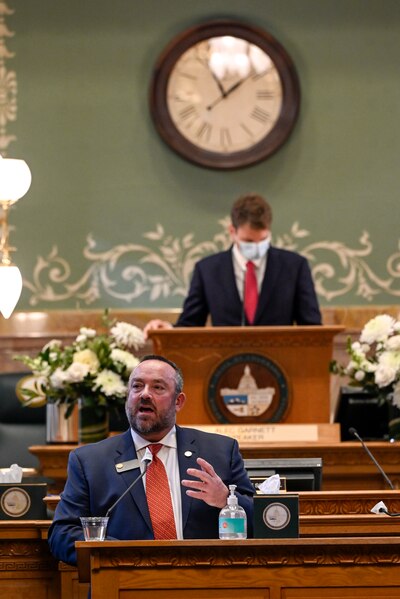Colorado lawmakers opened the 2022 legislative session with pledges to invest more in education and create more opportunity for the state’s students after two years of pandemic setbacks. Legislative leaders say there might even be a path to fully fund K-12 schools for the first time since the Great Recession.
Democrats touted their record — making kindergarten free to families and paving the way for universal preschool — and thanked educators for their work through two severely disrupted school years. Republicans, though, said four years of single-party rule in Colorado failed students and families who were left to fend for themselves during remote learning. They called for more money for schools and for parents to have more power in education.
Colorado is awash in money this year from both federal relief dollars and a better-than- expected economic recovery, even as a surge in COVID cases related to the omicron variant presents new challenges to schools already struggling with staffing shortages, student mental health issues, and uneven learning. At higher education institutions, enrollment has dropped, especially at two-year colleges, straining school finances, while state funding has not kept pace with inflation.
The opening day speeches and competing agendas set up an election year in which Republicans will try to make the case to voters that Democrats have not delivered on important promises and that they should have a shot at power.
Colorado Speaker of the House Alec Garnett, a Denver Democrat, said investments over the years have helped build a framework that will allow Coloradans to successfully move past the pandemic. He emphasized his party’s investment in the state’s universal preschool initiative and proposed record spending this year on education.
“We’re going to save people money on child care by expanding universal preschool,” Garnett said.
Garnett also praised educators for their work during the pandemic, especially as more teachers consider leaving the profession due to pandemic fatigue.
“I want to take a moment to acknowledge the dedication of every educator in the state who has bent over backwards to ensure that our students can continue their education despite the turmoil,” Garnett said. “Recognizing their heroic efforts and sacrifices, I vow to fight tooth and nail to ensure that we don’t divert a single dime away from public education.”
House Minority Leader Rep. Hugh McKean, a Loveland Republican, focused instead on how difficult remote learning had been for families. He called for more choice for parents and said students should have a plethora of options in getting from school to a career.
“Colorado students were already behind in reading comprehension and math and science. And we’re now finding out we lost even more ground,” he said. “We need better options when it comes to our kids’ education.”

In the Senate, President Leroy Garcia, a Pueblo Democrat, placed education among the bread-and-butter issues Colorado families discuss around the dinner table.
“We are going to invest in our most important resource, our children, to make sure they have the education, training, and support needed for a bright future,” he said.
Senate Minority Leader Chris Holbert contrasted the heated national education debates about critical race theory and police in schools with a much more basic challenge, that fewer than half of Colorado students can read on grade level.
“You want them to read Ibram X. Kendi? Great,” he said. “I might want them to read John Locke. But, as of today, the looming problem is that many students can’t read.”
The Republican legislative agenda includes proposals to require districts to post curriculum and teaching materials for parents to see, to allow parents to convert a struggling school into a charter, and to allow people to use tax-exempt accounts to pay off student loans.
But the centerpiece of their education agenda is a proposal to eliminate what’s known as the budget stabilization factor, money that Colorado withholds from K-12 education despite constitutional requirements each year to pay for other budget priorities.
Democratic Gov. Jared Polis’ proposed $40 billion budget calls for record education spending of $6.6 billion and the smallest withholding the state has seen in 13 years. It’s still $422 million that schools should get but won’t.
Education advocacy groups more typically aligned with Democratic lawmakers, especially the Colorado Education Association, the state teachers union, and organizations representing districts and school boards, arrive at the Capitol every year with a top priority of increasing funding and reducing the budget stabilization factor. With Colorado’s fiscal constraints, Democratic and Republican lawmakers alike have not seen that as realistic.
Could this year be different?
State Sen. Bob Rankin, a Carbondale Republican who serves on the Joint Budget Committee, believes it’s possible and sustainable. Enrollment is declining, so there are fewer students to pay for, and districts are collecting more in property taxes, thanks to rising home values, the repeal of the Gallagher Amendment, and tax policy changes pushed through by Democrats last year.
But the Republican proposal is coupled with a plan to give money directly to parents to spend on their children’s education, an idea that Democrats and teachers unions have shut down time and again.
Democrats say they’re also working on a plan to get rid of the budget stabilization factor — and welcome Republican support for that effort, so long as public money doesn’t go into private hands.
“It’s good to know there is bipartisan consensus on fully funding K-12,” said state Sen. Chris Hansen, a Denver Democrat who serves on the Joint Budget Committee. “We’re looking at a number of different ways to get there. There is a path. It necessitates some careful conversations.”
Polis’ budget includes some big asks, such as $500 million to shore up unemployment insurance, that would make it harder to invest more in education, and even within education, there are trade-offs between increasing districts’ base budgets and the state’s ability to spend more on certain groups, like special education students, Hansen said.
House Education Committee Chair Barbara McLachlan, a Durango Democrat and retired teacher, said she plans to run a bill every year to fully fund schools until it happens.
“We need to stop spending money on everything else but education,” she said. “If somebody owed me money since 2008, I’d be pretty pissed off too.”
Democratic leaders’ comments made clear they will be focused heavily on the rollout of the state’s universal preschool program, a key plank in Polis’ education platform.
Colorado will begin offering universal preschool at no cost to families starting in the fall of 2023. The program will be funded using proceeds from the passage of a nicotine tax that went into effect last year. The program will provide at least 10 hours of preschool a week, with some children getting additional hours and services based on their needs.
State leaders created an Office of Early Childhood to oversee the new program, but there’s plenty of work to be done to ensure a successful launch. Polis’ budget plans to spend an additional $13 million to help prepare.
State Sen. Janet Buckner, an Aurora Democrat, said on Tuesday during a Chalkbeat Colorado legislative preview that the state is working through numerous hurdles to ensure the upstart program runs smoothly.
“Some of these ideas might take a few years for providers to meet the bar, because it’s a high bar,” she said. “So we’re being very realistic about this. It’s not going to happen overnight.”
Early bills filed by Senate and House Democratic leaders included several education priorities. Senate leaders look to improve access to higher education for foster youth, improve K-12 reading outcomes, and allow community colleges to offer a bachelor’s degree in nursing. House leaders also plan to expand access to affordable child care, connect students in high school to more career opportunities, increase skills training to students, and create a new tax credit for early childhood educators.
While the contrasting speeches displayed the rift in how Democrats and Republicans view the last several years, there should be agreement on some education issues this year.
Lawmakers heading the Legislative Interim Committee on School Finance plan to file bills that would boost special education funding and change how K-12 schools calculate students and families facing financial challenges. Lawmakers from both aisles have expressed early support.
The state also has plans to use billions in federal pandemic stimulus money, and at least some of that will go to workforce development and career training. A new report released earlier this week should draw consensus on retraining adults hardest hit by the pandemic.
Democratic leaders, especially, hope the report will make needed investments to help businesses and Colorado’s colleges and universities connect students to meaningful careers. And career training has been an issue broadly supported by Republicans.
Watch Chalkbeat Colorado’s 2022 legislative preview.







